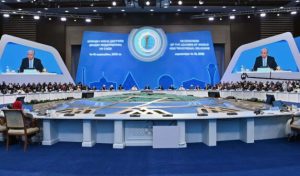In the wake of the tectonic global shifts following the cataclysm of September 11, 2001, as the world teetered precariously between reconciliation and rupture, the Republic of Kazakhstan advanced a gesture both daring and prescient. Against a backdrop of escalating religious mistrust and civilizational fracture, its leadership conceived the Congress of Leaders of World and Traditional Religions—an audacious initiative premised on the healing capacity of faith and the redemptive potential of spiritual diplomacy.
What began in 2003 as a nascent attempt to recalibrate the global discourse surrounding religion has since crystallized into a mature, triennial convocation of formidable moral significance. Now poised for its eighth iteration, to convene in Astana on 17–18 September 2025, the Congress has become not merely a forum for interreligious engagement, but a crucible for collective ethical recalibration in an age increasingly defined by entropy and estrangement.
The thematic locus of this year’s conclave—“Dialogue of Religions: Synergy for the Future”—artfully captures the exigencies of our historical moment. We inhabit a world disfigured by ideological polarization, beset by resurgent extremisms, and destabilized by widening gulfs in wealth, culture, and access. These maladies unfold alongside the mercurial ascent of artificial intelligence, environmental degradation, and algorithmic ethics—challenges whose resolution transcends jurisprudence and demands the intervention of our oldest ethical institutions: faith traditions.
As Chairman of Pakistan’s Council of Islamic Ideology and steward of the venerated Jamia Naeemia seminary in Lahore, I contend that the Congress occupies a critical juncture. It echoes Pakistan’s own constitutional commitments to religious pluralism, equitable coexistence, and moral governance. Pakistan’s struggle against fanaticism has illuminated an essential truth: legislation, however robust, is impotent without a moral substratum. What is required is a counter-narrative—rooted in transcendence—that binds rather than severs, uplifts rather than castigates. The Congress offers just such a moral lodestar.
Of particular resonance this year is the Special Session on the Protection of Religious Sites, an imperative given the global uptick in profanations of sacred spaces. Whether minaret or monastery, shrine or synagogue, these loci of the sacred constitute more than architectural heritage; they are embodiments of memory, identity, and the metaphysical grammar of entire communities. Their desecration signifies not only a violation of spiritual terrain but an affront to the very premise of our shared human condition.
The Congress’s collaboration with the United Nations Alliance of Civilizations (UNAOC) and its endorsement of the UN Plan of Action to Safeguard Religious Sites, further augmented by the recent commitments of the Pact for the Future adopted at the 2024 UN Summit, represents an urgent institutional recognition that spiritual sanctity and human dignity are indivisible. This alliance transcends symbolic diplomacy, articulating a pragmatic commitment to safeguarding the sacred against the profane encroachments of intolerance.
No less significant is the Congress’s pivot toward the youth and the digital ethos—a discerning acknowledgment that the future custodians of our moral heritage are digital natives navigating an unprecedented ontological frontier. The convening of the Forum of Young Religious Leaders within the Congress framework signals an awareness that moral literacy must now contend with the seductions of virtuality, the epistemological instability of online discourse, and the ethical ambiguities posed by artificial intelligence. Faith, in this new terrain, must evolve from ceremonialism into compass—a heuristic of conscience amidst algorithmic noise.
In this light, the VIII Congress must not be seen as a mere ceremonial congregation, but as an axial moment—a potential inflection point where the world’s spiritual vanguards collectively confront the moral lacunae of modernity. Its final declaration, we trust, will not lapse into platitude, but will resonate as a clarion call for justice, humility, and planetary solidarity—principles that must filter into the warp and weft of national policies and global governance alike.
At its most elemental, religion enshrines the sanctity of existence, the irreducible worth of every soul, and the covenantal duty of community. It commands that we transcend hatred, dismantle prejudice, and embody humility. Within Islam, there resounds a particularly lucid articulation of this universal ethic: “O mankind! We created you from a single pair… and made you into nations and tribes that you may know one another” (Qur’an 49:13). This verse does not merely celebrate diversity; it mandates its embrace as divine design, not deviation.
May this Congress—set against the backdrop of a fragmented and fatigued world—rekindle a collective commitment to such enduring verities. Where there is confusion, may it proffer discernment; where alienation prevails, may it extend communion. And where despair threatens to calcify, may it summon faith—not as dogma, but as dialogue; not as exclusivity, but as expansive human solidarity. The author is: Chairman, Council of Islamic Ideology, Pakistan )
60


